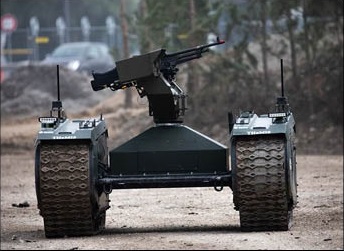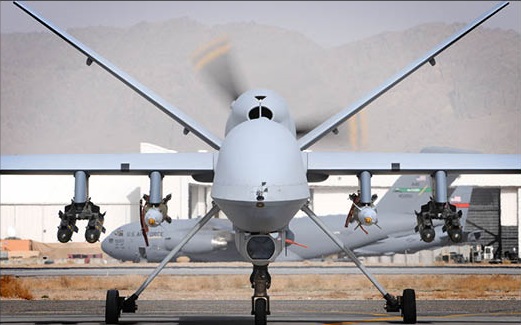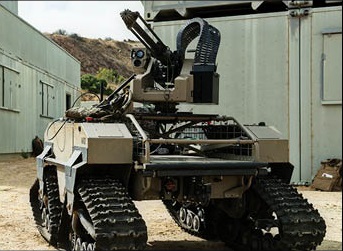The Lethal Autonomous Weapon System (LAWS) notion explains the technologically advanced military systems capable of working independently to search and engage targets based on a specific description that is linked to a computerized program. These automated weapon systems or digitally programmed armaments can carry military operations in space, land, water, underwater and air. So, LAWS’s multi-dimensional characteristics enable technologically advanced nations’ armed forces to integrate various kinds of robotic weapons or killer robots in their conventional force structures. The upgradation of conventional armed force structures under the broader notion of computerization of weapons has altered the traditional nature and traditional performance of the basic weapon systems across the globe. Due to their independent characteristics cemented in autonomous-decision making and autonomous-target attacking features, the rise of LAWS has propelled the international system towards the modern digital means of warfare. It is accepted globally that the autonomy in functioning under different landscapes without human involvement is equally helpful in offensive and defensive military operations.
The battles without physical contacts have become an unquestionable future, in other words the war of robots has reduced the risk of human life in military operations, which has integrated these killer machines into the states’ mainstream national security infrastructures. These unmanned military devices equipped with various kinds of armaments contain the potential for becoming the demand of every nation due to their multiple benefits.
The international community has started acquiring and adding digitally developed automated weapon system in their mainstream defense planning without understanding their negative impact on the world. No doubt, the lack of meaningful human control or human supervision on the autonomous weapon system has increased the systemic control or command over the use of force during the military operations, but the combination of autonomous and semi-autonomous military devices equipped with lethal weapon system has become a permanent feature of future armed conflicts. In this way, the escape from fully-autonomous weapon systems is gradually becoming merely a theoretical concept without having its practical relevance to the future of world politics. In order to place the rival forces at a disadvantageous position, along with minimizing the loss of human lives on the battlefield, LAWS has increased the efficiency of armed forces. The combination of an increased persistence rate and these weapons’ versatility have further enhanced these digitally programmed weapon systems’ independent functioning in military operations.
This article’s central theme aims to explain the notion of independently functioning computerized armed systems capable of searching, selecting, and attacking their targets in different military operations. Generally, the arrival of such lethal military devices has changed the strategic outlook of global power politics because the increasing role of such weapons has altered the traditional notion of warfare. Thus, an unprecedented upgradation in the conventional nature of warfare with the development of fully autonomous weapon systems has become a permanent feature of the international political order in which all states are equally vulnerable before the prevailing future of robotic military devices capable of leaving devastation impacts on the whole global system. In this way, this writing is an attempt to provide a glimpse of automated weapon systems capable of functioning under specific computerized commands and their relevance to the contemporary international system.
The rise of LAWS, their worldwide promotion and their widespread appreciation have rung alarm bells among the international community because the integration of automated weaponry in the conventional notion of armed forces has changed the global strategic setting’s traditional view. The technologically advanced and technically improved features of computerized weapon systems are an irresistible change in the nature of warfare, but it has modified the conception of power politics between states. The granting of greater decision-making powers to their computerized programming increases the risks of negative or critical outcomes. In contrast to the humanistic characteristics of judgment and reasoning during a military campaign, the absence of human control over autonomous weapon systems and their continuously swelling presence in military operations has become an inevitable reality. The inability to work in the complex, dynamic and unpredictable environment portray a worrisome picture because a widespread promotion of digitally-operational weapon systems is becoming a common point of concern for the international community. The inception of these weapon systems into the state will make the entire international community a victim of independently workable mechanical military systems. It is widely believed that the lack of humanistic conscience to dictate death and life decisions made by these armed machines are fundamentally designed to serve the broader national security interests of states to follow the pre-programmed computerized commands strictly. Parallel to criticizing their overwhelming role in the states’ modern force structures, the unprecedented growth of these weapons has resulted in the leading defense infrastructures of countries in developing, acquiring, trading, and using these independently operational weapons systems in mainstream military campaigns. This trend results from an intense engagement of military commanders, industrial manufacturers, and computer programmers in the nation-governments’ national security planning.
As a result, the leading security architectures of various nations involved in major armed conflicts have started acquiring LAWS technologies, leading their governments empowering their national armies. In this way, the application of artificial intelligence in different weapon systems is directly linked to the evolving nature of power politics between states. A unique combination of different computerized attributes of modern weapons systems has led various states’ governments to obtain the LAWS to achieve their national security interests. The great power competition between various nations has muddied the global security environment. Governments have started preferring these modern weapons systems over their conventional defense system because an extensive investment in the automated weapon systems can help the states augment their strategic lengths against potential rivals. Apart from their widespread promotion globally, some states have started raising their concerns about banning LAWS in the international system. It is widely believed that the inception of such weapons in mainstream military campaigns leads the global society towards an era of military digitalization where a deadlier and disturbing future has become an inevitable reality. The use of such automated weaponry in military campaigns directly affects the states’ abilities of formulating different plans of global peace settlements. The proponents of peace worldwide have started opposing the rise of LAWS in the international system because it has hampered the proposed scenarios for peaceful arrangements in different regional interstate conflicts. So, the spread of automated weapon systems has compelled the proponents of peace from different parts of the world to oppose LAWS’s integration in the states’ national security mechanism. People living in the world’s capitals initiated various transnational initiatives at regional and extra-regional levels against the promotion of unmanned gadgets and devices in the armed forces. As a result, a massive wave of global networking consisting of different governmental and non-governmental organizations in different countries against the states’ national security infrastructures’ autonomously working machines is becoming a common trend.

A voice for globally banning LAWS’s in the world equivalent to opposing their development, production, trade, and stockpiling is becoming a global tendency. This opposition is inherent in the autonomous functioning, restricting these computerized devices from making situational decisions about life and death. The absence of a humanitarian aspect in such a weapon system has increased the element of lethality in their performance, which could become an unpredictable global catastrophe. Their destructive impacts are inherited in their unique features, present in the past’s robotics defensive systems. In contrast to the development of the civilian idea of robotics, which was commonly helpful in managing various domestic affairs, the militarized versions of robotics are designed to perform functions beyond human control. The progress in the computerized versions of a defense system linked to a specific program has changed the actual concept of autonomously working robotics. The element of autonomy creates greater unpredictability in the role of automated weapons on the battlefield. The increased autonomy has made these robots highly critical in normal defense systems. The mechanical capabilities of sorting various data formats based on computerized analysis make these weapons perform their repeated actions without reducing their performances. The spread of these robotic weapons in the world is due to various benefits, including the high level of their accuracy and the advanced capability for managing multiple tasks, on the one hand. On the other hand, their inability to adopt unpredictable situational changes makes these automated machines produce unexpected or undesired functions during military operations. Moreover, high-speed elements with increased efficiency diminish their capability to distinguish the combatants and non-combatants in the counterinsurgency operation, increasing the probability of collateral damage as accidental results of a military operation. The leaders of different nations and various international organizations have realized the negative impacts of these weapon systems, which were specifically designed to work without considerable and meaningful human control. The proponents of peace say it is an international duty of all countries to accept the principle of retaining human control over the use of force through different weapons. The ethical and legal imperatives of international law also dictate the world’s leaders invest their full potential in protecting humanity from the worse impacts of such destructive military devices.
Under the general moral obligations, Human Rights Watch, coupled with different other organizations, has launched a global initiative, the “Campaign to Stop Killer Robots.” The United Nations Secretary-General also urged the international community to prohibit the emergence of automated weapon systems by calling them morally repugnant and politically unacceptable. Apart from the international level, a regional level meeting to design a comprehensive regional initiative against the LAWS was arranged in Islamabad. The representatives of various South Asian nations decided to promote an international initiative, the “Campaign to Stop Killer Robots.” In an alliance with the global campaign, an Islamabad-based non-governmental organization working in different areas for promoting peace in the country decided to raise its voice for banning LAWS. The Sustainable Peace and Development Organization (SPADO) is trying to organize an extra-territorial alliance of different nations worldwide against automated weapon systems in armed conflicts. Analogous to SPADO, a widespread network of different nations has decided to stand against the rise of a digitally programmed weapon system mechanically designed to perform their functions independently. Similar to Pakistan, the governments of Algeria, Argentina, Austria, Bolivia, Brazil, Chile, China, Colombia, Costa Rica, Cuba, Djibouti, Ecuador, Egypt, El Salvador, Ghana, Guatemala, Holy See, Iraq, Jordan, Mexico, Morocco, Namibia, Nicaragua, Panama, Peru, State of Palestine, Uganda, Venezuela, and Zimbabwe called upon the whole world officially for supporting the global campaign for banning the fully autonomous weapon system. In this way, the need to initiate and conclude negotiations for the prohibition of fully autonomous weapon systems has been realized globally. This global trend activated various circles of policymakers, legislators, private companies, and domestic and international organizations to support the campaign for stopping the rise of automated weapons in the states’ national security planning.

Political leaders and mainstream government officials of different countries have started expressing concern about banning a fully autonomous weapon system. Algeria’s government said there is “a need to adopt appropriate measures so that the use of this technology respects human rights.” The Algerian political authorities expressed several legal, ethical, and moral concerns linked to the automated weapons and their independently functioning characteristics. The Algerian behavior shows the international community’s worries in which the state officials are anxious about the rise of another arms race in the world in the form of proliferation of fully autonomous military devices equipped with different weapons. On behalf of the Group of Latin American and Caribbean Countries (GRULAC), Argentina communicated its highest concerns on the increasing role of computerized armaments programmed for functioning without human controls. Buenos Aires believes these weapons will empower the offensive capabilities of armed forces, which will foster the potential of reprisal, retaliation, and terrorism. The Argentinian government has realized the necessity “to preserve meaningful human control at all phases of the development and use” of digitally automated armaments. While supporting the Argentinian argument, other states from the South American region also explained their positions for the need to formulate a “preemptive prohibition of the development of lethal autonomous weapons systems.” A highly responsible and humanistic concern comes from Beijing, where the Chinese leaders seriously consider the highly destructive role of digitally automated weapons. These weapons comprise an extensive perspective for upsetting the global strategic balance by affecting arms control’s worldwide agenda.
The Australian government holds a different position over the LAWS because its state officials do not see an immediate need for a new treaty to address the rise of lethal autonomous weapon systems. Along with Australian, American, Israeli, British, and Russian governments, as well as many other states are reluctant to address the negative impact of militarized robotics in the world seriously. These countries are running a multidimensional military-industrial complex capable of producing different kinds of computerized weaponries. Israel’s Jewish officials refused to accept the critique of lethal autonomous systems by advocating a mechanical future’s positive characteristics, mainly consisting of independently workable armaments. Akin to Tel Aviv, Moscow refused to consider the LAWS as a reality soon due to its massive funding to produce such weapon industry research. The Russian officers say the concept of human involvement and human control are subjective assessments and are irrelevant. The United Kingdom formally refused to support the need for an international ban on the weapons capable of working beyond human control by maintaining that the existing international humanitarian law provides sufficient principles for regulating the use of autonomous weapon systems. The British weapon industry is actively engaged in developing weapon systems equipped with independently programmed features. In the group of states opposing the need for a worldwide dialogue for finalizing the treaty for banning the LAWS, the United States neither discourages nor prohibits the manufacturing of autonomous functioning characteristics of modern weaponry. Washington is engaged in investing heavily in advanced military applications in artificial intelligence, capable of providing air, land, and sea-based weapon systems. The American state officials believe that the existing international humanitarian law is adequate to regulate different weapons. The Australian government adopted an identical stance to Washington over the need for negotiating a new global legal framework to monitor the production and development of fully-autonomous weapon systems.
The varying positions of states on the description and significance of fully-autonomous weapon systems show the relevance of highly advanced computerized armaments to contemporary world politics. According to the international community, the international strategic landscape has embraced another revolutionary change in warfare, which is recognized as a paradigm shift in the global strategic environment. In response to the increasing role of various unmanned arms and their rising values in the states’ mainstream national security strategies, a gigantic wave of multiple campaigns for understanding the uncontrollable effects on nations has become a global demand. The combination of LAWS-combating and LAWS- condemning campaigns is designed to force the great powers to adopt humanistic values in their broader strategic considerations. The advocators of international peace efforts call upon the leaders of the great powers to rationally understand the worst impacts of autonomously functioning military weapon devices. The features of independently selecting a target, engaging a target, and attacking a target are the real worries which can become a potential challenge. In view of the above discussion on the inception of modern weapon systems, the arrival of these armaments in the world can probably escalate a new form of arms race in interstate conflicts while intensifying different regions’ security environments. In this way, various formats of efforts are arising from different corners of the world under a multilateral framework to bring a maximum of states on the agenda of banning LAWS and are becoming a global voice. The need to negotiate a multilateral treaty among different states has been realized and admired by various circles of political authorities and legislative bodies. The strategic communities of diverse backgrounds having varying opinions on different world security matters have accepted the need for constraining the role of lethal automated military devices. Therefore, more diplomatic talks and formal support of developed nations is needed to bring third world countries onto the agenda of banning killer robots’ role in the governments’ strategic priorities. The international community must realize the immediate need for aligning the principles of banning the LAWS to the contemporary formats of international humanitarian and human rights laws.




